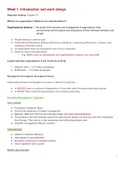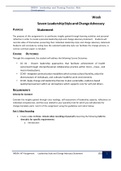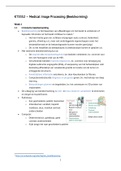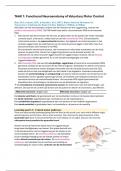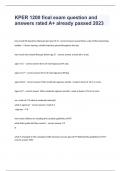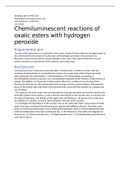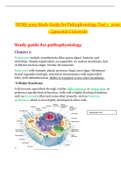Week 1 Lecture 1: Introduction
What is Philosophy?
Philosophy is the study of the fundamental nature of reality, existence, and our knowledge thereof.
Greek origins
The Socratic methods and the Aporia of Philosophy
What-is questions
- Example what is the nature of human being?
- A definition states what is necessary as well as what is sufficient for something to come under a
certain concept
- Definition of man as animal rationale or as trading animal
What is Philosophy?
Importance of philosophical reflection on basic concepts
- Basic concepts self-evidently structure the way we understand phenomena
- Enables the assess whether phenomena fall under the concept or not
o Is “Uber” and “AirBnB” an organisation?
- Questioning basic concepts enables a critical attitude
Importance of Philosophy of Science in enabling a critical attitude
Importance of ethics in enabling a critical attitude
What is Philosophy?
Beyond dictionary definitions: meaning of key concepts (connotation and denotation) and their
implications
Structure of what-is questions:
- What is … an organisation?
- Conversation of prevailing opinions
o An organisation is a collection of people working together to achieve a common purpose
o An organisation is an open system that transforms inputs form the environment into product outputs
- Look for counterexamples or exceptions and question the meaning of concepts in current definitions
- Adjust definition of key concept and so on …
One univocal meaning or only family resemblances?
What is Philosophy?
Tendency to identify essential characteristics of the content of key concepts (meaning of the content)
What-is (essential) and how-is (existentia)
Think of the work of an entrepreneur who starts his or her new business:
- Does the existence of the company consist in the presence of the features described by the definition?
Meaning of the relation:
- Is the economic relation the only relation the entrepreneur has toward the business environment?
Meaning of the execution:
- What does it mean to be an entrepreneur?
Example: what is work?
Try to reflect on the meaning of the relation of work? How is the worker related to the organisation he or
she works for?
Try to reflect on the meaning of the execution of work? What is the meaning of work in your life?
What is work?
Meaning of the content: Work as transaction (human activity in exchange for a fee)
Meaning of the relation
- Work as means to survive (life supporting)
- Work as expenditure of life
- Work as appropriation of life (self-expression and intensification of life (welfare state)
Meaning of the execution
- Does work belong to human nature: Homo Faber?
1
, Arendt on work
- Vita activa versus vita contemplativa
- Labour, work, action -> Work as social relation
What is Philosophy?
Importance of philosophical reflection on basic concepts
- Basic concepts self-evidently structure the way we understand phenomena
- Enables to assess whether phenomena fall under the concept or not
o Is helping a friend work?
- Questioning basic concepts enables a critical attitude
o Is human being the homo faber?
Two related aspects of Philosophy which are central in this course: Philosophy of Science and Ethics
Philosophy of science
Philosophy of science is about how science must be conducted to obtain reliable knowledge of the world.
It deals with questions such as:
- Is there such a thing as the scientific method?
- Can theories ever be proven true? (Or false?)
- Do empirical laws about social (economic) life exist?
- Can science be value-free and politically unbiased? Should it be value-free?
Ethics
Ethics is systematic reflection on moral questions (‘Wat is the right thing to do?’) and on relevant values,
duties and virtues
- Basis for responsible practices
Ethical perspective: normative, impartiality, universal pretention, argumentative, engagement
Goal of the course
Philosophy of Science, questioning basic concepts and ethics enables a critical attitude towards
student’s disciplines of work
Critical citizenship and participants in a democracy as the goal of academic education programs (Dewey)
- Versus focus on (economic) usefulness of education (Smith)
Week 1 Tutorial 1: Ethical dilemma’s
Ethics game
Week 1 Lecture 2: What is ethics?
What is ethics?
Thinking about what the morally right thing is to do
Systematic reflection on our moral practices, values and norms, and the practical moral questions we
encounter
Different levels:
- Philosophical thinking about morality
- Practical reasoning about what one should do in specific situations
But… what is morality?
The norms and values that determine what is right and wrong in the way how we act towards one another
(“what we owe to each other”)
Morality is paramount, often implicit
Necessary for us to live together (and flourish)
Many of our moral norms we just take for granted, and we mutually expect each other to comply to those norms
In case someone does not, we ask questions, hold her/him responsible
Morality not just about choices in personal life, also about how society functions ( law!)
Difference with law:
2
, Many laws are cristallisation of moral values, but
Legal requirement moral duty
- Many laws are morally indifferent
- Laws can be morally unjust, wrong
- “Morally right” often can’t be legally enforced
Validity of laws limited to jurisdiction / country
What does it take to ethically reflection a moral problem?
5 ethical perspectives:
Normative
Impartial
Universal pretention (rejection of moral relativism; beyond subjectivism)
Reasonable
Engagement
Ethical perspective – just everyone’s own?
Isn’t ethics a subjective matter – bound to each person’s (or culture’s) own perspective?
Normative
Ethical reflection about a moral problem
Not primarily about what people think about the problem, what most people choose, or how often it
occurs, (factual, empirical matters)
But about what is right and good
- Appeals to values: what have reason to want for ourselves and for others
- In ethics: focus on what we consider to be intrinsically worthwhile: good for its own sake
- Examples: well-being, freedom, justice, knowledge, respect, honesty, biodiversity, knowledge,
friendship, etc.
Impartiality (or: all-partiality)
What is good and what is owed to others
- Not just personal goals but … what is good, acceptable, obligatory from an impartial point of view
However: certain roles may involve special duties (and thus room for partiality)
Universal
Basic moral claims aspire to universal validity (for example human rights)
But isn’t ethics rather subjective, or relative to culture?
There are many cultural differences regarding what people believe morally right
Does this imply moral relativism?
- Moral relativism is a theory that states:
o What is morally right and wrong depends on the moral code in one’s culture
o Therefore, there is no moral code/principle that is culture-independent
- Problems with moral relativism:
o A logical problem: the fact that there is moral diversity does not imply the norm that one ought to
act according to the local cultural moral code
o A conceptual problem: people nowadays are part of a variety of (sub)cultures; what code should
I obey?
o A conceptual/normative problem: moral progress is inconceivable, as this presupposes a
universal standard
o A normative problem: some practices are immoral even if they are accepted in some cultures
Reasonable
Appeal to public reason – moral judgement must be justifiable to others; non-dogmatic
- Importance of arguments: we hold each other responsible being able to justify choices to others
- “This is just what I believe”, or “... feel” – that is insufficient
- Appeal to reasons that others can understand and endorse
Ethics cannot be just a subjective/personal matter !
Engagement
3


